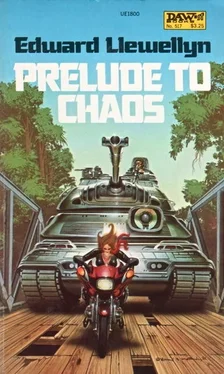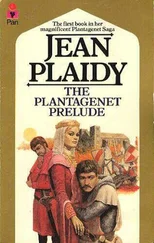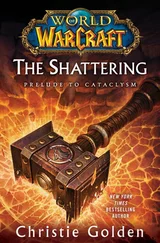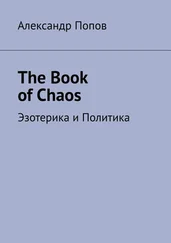The rigid social structure of the Settlement made it difficult for any single man and woman to be alone together. I, as an outsider, was free from many of the restrictions which constrained Believers; Judith, as an insider was not only constrained but watched to make sure that her behavior did not offend the Light. The first chance I had of talking to her privately was on the night that President Michael Randolph spoke on the State of the Union.
The importance of his address to the nation was emphasized by the fact that it was carried live in prime time by all US and Canadian networks, and relayed by Settlement cable. Outside TV was banned in Sherando, and as most of the cable programs were educational or inspirational I had given up watching television. That night I went to the General Assembly, one of the few opportunities for men and women to mix, and managed to get a seat next to Judith.
She greeted me without warmth but with relief. My presence as an ostensible suitor was of some value to her as protection against the disapproval of those around us. And when the President started to speak we became too engrossed to worry about what they thought.
Michael Randolph was a good speaker, a better speaker in fact than Grainer, for whom he had often spoken. That evening he spoke without notes, an honest American speaking to other honest Americans. Simple, straightforward, and utterly convincing. He must have convinced most viewers across the nation. The words were his, the voice was his, the phrases were his. Only afterward did I realize that the concepts were those of the Teacher and the plans were those of Grainer.
He started with the traditional Presidential invocation, “My fellow Americans,” but thereafter said little that was traditional. He told the youth of the nation that they must prepare to carry a double burden. “The burden you carry now and the burden which the generation after you would usually carry. Because statistics make it certain that generation will be smaller than even the pessimists have suggested. In middle age you will have to support us as we grow old and the new generation of children who will be born when the birth rate again starts to rise, as rise it surely will!”
“The poor dumb bastard believes that!” whispered Judith.
“We Americans can meet the challenge, as we have met other challenges in the past You of the rising generation will not be left to meet it unaided. Today I am placing the nation on a war footing. But not the kind of war in which the youngest and best of us have to suffer and die. A new kind of war; a war against future poverty and suffering. Now, while America is in the bloom of her full strength, all of us must direct our every nerve and sinew to serve the nation after we are gone.”
“Now he’s misquoting Kipling!” muttered Judith.
“Quiet damn you!” I hissed.
“At present American industrial production is increasing at a rate unprecedented in our history. A rate of increase not achieved even in past wars. The programs initiated by my great predecessor, President Grainer, are now bearing fruit”
“Grainer?” whispered Judith. ‘The President who thought himself king!” I almost slapped her.
“I am shifting America into a war economy. But not to produce the weapons of war. I am not diverting the energies and skills of the American people toward the creation of engineering and scientific miracles whose only purpose is to destroy, whose only end is to be destroyed. Our efforts will be to build every variety of useful product, from the most complex electronic equipment to the simplest of hand tools. To build things to serve both the present and the future.
“We live in a prosperous age, the most affluent age in human history. That prosperity, that affluence, will continue. But it must be an affluence without excessive luxury. The kind of prosperity which demands sacrifices, the full-employment which in the past has only occurred during periods of rearmament and war, the times when every citizen was needed to produce the weapons our fighting men and women needed to defend our country. From now on the skills and labor of every American will be needed to create products of permanent value. Not to be shot in the air, or sunk in the sea, or exploded in the earth. We must start to produce for preservation. We must produce to serve our posterity.”
I began to see the object of all this political rhetoric.
“In this tremendous national effort we must all make sacrifices, as we have willingly made sacrifices in the past when our nation was in peril. We must practice accelerated cost-containment intervention, turn away from the tawdry and the superfluous. We must not squander energy, materials, and human effort on making things to fill a created demand, on novelties to titillate our taste for novelty, on responses to the caprice of changing fashions. We must concentrate on the creation of things which have durability and use. And, as a personal opinion, educated as I am in the views of that great creative American, Thomas Jefferson, I believe that in creating such things we will also be creating beauty. The real beauty shown by the useful and the good.”
“There will be work for all, good wages for all, rewards for all. And all of us must join together in this great and humane effort. We cannot allow the private interests of selfish groups, whether they be those of capital, or labor, or self-elected elites, to interfere with our common effort.”
I didn’t like the sound of “self-elected elites” nor, judging by her frown, did Judith.
Randolph continued to exhort us to unite in productivity, to create surpluses for which the Administration would provide a market. Vast storage depots were already being erected. Supply bases on which we ourselves could draw later when the productivity of an aging population started to fall. Supplies which future generations of Americans would surely need.
He finished with a word from those Americans, about eighty-five percent of the population, who were either pure consumers or whose jobs had no possible relevance to future needs. He urged them to shift to vital industries, to learn new skills, even at the cost of some personal privation. “My Administration will supply without charge the equipment and materials so that every American can preserve those possessions for which he or she has no pressing present use, but which will be of great use in the low-production phase ahead. Each one of you can make your own personal gift to the future, secure in the knowledge that some future American will accept your gift with gratitude.”
It began to dawn on me what Randolph was attempting; he was trying to give meaning to lives that would seem increasingly pointless as people aged and their civilization decayed. To inspire every individual to commence some task which would occupy him or her during the bleak days ahead. It was not the speech of a posturing politician but the attempt of a President to give leadership to his people.
Randolph was doing his best, and was doubtless getting his message across to millions. But Grainer would have done it better; not perhaps in his words but by his acts. And certain of Randolph’s statements stirred the strings of my memory; remarks I had heard Arnold Grainer make some six years before.
Suddenly the situation, came into focus. Grainer had known! He had known then what was about to happen now. Back in 2020 he had known. That was why he had plunged into politics, had fought to win a presidency he had never enjoyed.
Had he been a secret disciple of the Teacher? Or had he had access to the same knowledge that had set the Teacher off to preach withdrawal from the Affluence to his privileged followers? Whatever the truth, Arnold Grainer had fought to gain the power that would let him work for the well-being of the many rather than the survival of a believing elite. He was not here to complete it because he had been murdered to serve Gerald Futrell’s ambition!
Читать дальше







![Айзек Азимов - Прелюдия к Основанию [= Прелюдия к Академии // Prelude to Foundation]](/books/435122/ajzek-azimov-prelyudiya-k-osnovaniyu-prelyudiya-k-ak-thumb.webp)




